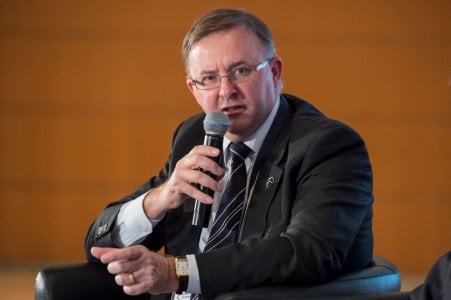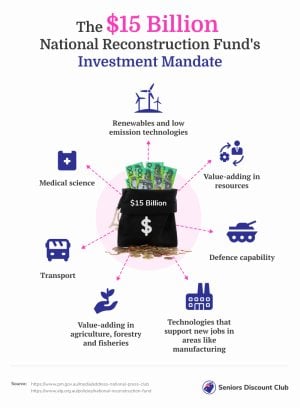Another year of hardship ahead? PM Anthony Albanese issues telling words on potential tax hikes for Aussies
- Replies 14
It's no secret that the economy is going through a tough time right now, with Australians caught in the grip of a cost-of-living crisis and record-high interest rates.
With that in mind, it's no wonder Prime Minister Anthony Albanese had a particularly sombre message to share with the nation when he appeared before the National Press Club in Canberra on Wednesday.
When asked whether the public need to accept that taxes may have to rise to fund a variety of state initiatives such as Medicare and defence, the PM gave a response some found lacking, at least in terms of concrete policy changes:
‘Interest rates impact not just households, but impact the national budget as well,’ Albanese said.
'We'll continue to have a conversation with the Australian people about what's needed going forward.'

In other words, possible tax increases aren’t entirely out of the picture, especially with the funding needed to power programs such as the National Disability Insurance Scheme.
Higher interest rates on government debt, which is worth nearly $1 trillion, also factor into the picture, which hints at more sacrifices ahead for Aussies.
‘We won't be able to do everything that we would like to do,’ Albanese continued.
'I can think of a number of measures that I would have liked to do last budget, let alone this next budget, that is just not possible to achieve all of that in a short period of time.'
Among the changes highly speculated to occur are those regarding superannuation tax breaks, which were brought to the fore by recent statements from Treasurer Jim Chalmers.
Chalmers was earlier reported to be pushing for a cap for a small percentage of wealthy Aussies with superannuation fund balances ranging upwards of $3 million in an effort to make the scheme more ‘equitable and sustainable’.
The Australia Institute found that current superannuation tax breaks would cost the government $52.5 billion for this fiscal year — almost as much as is spent on the Age Pension.

Albanese took on a more toned-down stance and stressed that there weren’t big changes in the pipeline for superannuation, as promised during his campaign.
‘We said we would not have any major changes in superannuation, and that is certainly our intention,’ he said.
‘But we’ll receive the report into superannuation, we think that it is important that this continue and that we do have a debate about the purposes of superannuation, of reinforcing what it is there for.’

Albanese also characterised his government’s strategy moving forward as one of ‘relief, repair, and restraint’, recognising the challenges ‘inherited’ from previous terms as well as global headwinds borne of the COVID pandemic, Russia’s invasion of Ukraine and the rise of inflationary pressures the world over.
Other policies he addressed included the establishment of a National Reconstruction Fund (NRF) worth around $15 billion as stimuli for various local industry sectors such as renewable energy, medicine, agriculture, forestry, and fisheries.
‘The NRF – which the House of Representatives will be voting on next month – represents one of the biggest-ever investments in Australian manufacturing capacity,’ Albanese said.
The fund will be ‘independently-run’ and free of ‘marginal seat politics’, according to the Prime Minister.
‘It’s about building a more resilient and more diversified economy, with more jobs in regional Australia.’
‘It’s about national security through economic sovereignty - our capacity to stand on our own two feet.’
‘Our National Reconstruction Fund will help grow and create industries over the long-term… Revitalising our traditional strengths but seeking out new ones.’

You can find the full transcript of PM Albanese’s speech here and the following question-and-answer portion with the National Press Club here.
So, what are your thoughts on potential tax hikes as economic pressures catch up? Is it something you see as inevitable or should the government find other ways to keep its programs up and running without placing an added burden on Aussies?
Tell us in the comments section below!
Source: YouTube/ABC News Australia
With that in mind, it's no wonder Prime Minister Anthony Albanese had a particularly sombre message to share with the nation when he appeared before the National Press Club in Canberra on Wednesday.
When asked whether the public need to accept that taxes may have to rise to fund a variety of state initiatives such as Medicare and defence, the PM gave a response some found lacking, at least in terms of concrete policy changes:
‘Interest rates impact not just households, but impact the national budget as well,’ Albanese said.
'We'll continue to have a conversation with the Australian people about what's needed going forward.'

The PM said more conversations were due with Australians moving forward as the nation faces economic pressure on various fronts. Image Credit: Flickr
In other words, possible tax increases aren’t entirely out of the picture, especially with the funding needed to power programs such as the National Disability Insurance Scheme.
Higher interest rates on government debt, which is worth nearly $1 trillion, also factor into the picture, which hints at more sacrifices ahead for Aussies.
‘We won't be able to do everything that we would like to do,’ Albanese continued.
'I can think of a number of measures that I would have liked to do last budget, let alone this next budget, that is just not possible to achieve all of that in a short period of time.'
Among the changes highly speculated to occur are those regarding superannuation tax breaks, which were brought to the fore by recent statements from Treasurer Jim Chalmers.
Chalmers was earlier reported to be pushing for a cap for a small percentage of wealthy Aussies with superannuation fund balances ranging upwards of $3 million in an effort to make the scheme more ‘equitable and sustainable’.
The Australia Institute found that current superannuation tax breaks would cost the government $52.5 billion for this fiscal year — almost as much as is spent on the Age Pension.

Aussies with superannuation funds ranging into the millions might see changes in their tax rates as part of moves to make the scheme more equitable. Image Credit: Unsplash
Albanese took on a more toned-down stance and stressed that there weren’t big changes in the pipeline for superannuation, as promised during his campaign.
‘We said we would not have any major changes in superannuation, and that is certainly our intention,’ he said.
‘But we’ll receive the report into superannuation, we think that it is important that this continue and that we do have a debate about the purposes of superannuation, of reinforcing what it is there for.’
Key Takeaways
- Prime Minister Anthony Albanese has warned the federal budget is under strain because of the cost of sustaining key government programs and rising interest rates.
- Amid questions on whether or not financial pressures Australia faces would mean tax hikes in the future, Albanese said his government ‘will continue to have a conversation’ with Aussies about the future.
- Albanese said the government’s economic agenda moving forward is one of ‘relief, repair, and restraint’.
- He also unveiled an ambitious $15 billion National Restoration Fund for key industries to spur local economic growth.
Other policies he addressed included the establishment of a National Reconstruction Fund (NRF) worth around $15 billion as stimuli for various local industry sectors such as renewable energy, medicine, agriculture, forestry, and fisheries.
‘The NRF – which the House of Representatives will be voting on next month – represents one of the biggest-ever investments in Australian manufacturing capacity,’ Albanese said.
The fund will be ‘independently-run’ and free of ‘marginal seat politics’, according to the Prime Minister.
‘It’s about building a more resilient and more diversified economy, with more jobs in regional Australia.’
‘It’s about national security through economic sovereignty - our capacity to stand on our own two feet.’
‘Our National Reconstruction Fund will help grow and create industries over the long-term… Revitalising our traditional strengths but seeking out new ones.’

PM Anthony Albanese floated the $15 billion National Reconstruction Fund plan anew to revitalise the economy amid global headwinds. Image Credit: Seniors Discount Club
You can find the full transcript of PM Albanese’s speech here and the following question-and-answer portion with the National Press Club here.
So, what are your thoughts on potential tax hikes as economic pressures catch up? Is it something you see as inevitable or should the government find other ways to keep its programs up and running without placing an added burden on Aussies?
Tell us in the comments section below!
Source: YouTube/ABC News Australia
Last edited:







